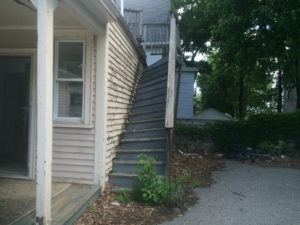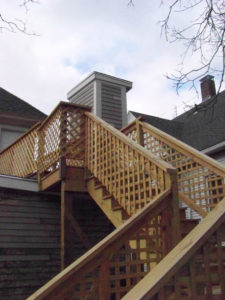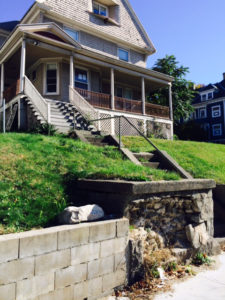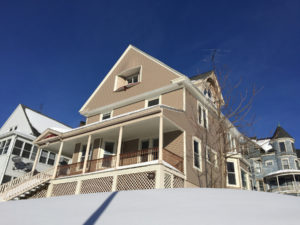Vacant for two years and neglected for longer, the circa-1890 two-family house at 175 Lincoln St. here was an eyesore. A retaining wall was collapsing and obstructing the sidewalk. The roof had deteriorated. An exterior staircase was tilted at a fun house angle.

The house was referred to Massachusetts Attorney General Maura Healey as a candidate for her office’s Abandoned Housing Initiative. Restored, the 3,000-square-foot, six-bedroom two family was for sale in March for $260,500.
Attorney General Healey toured the house March 7 with Worcester city officials. She cited the rehab project as a success story for her office’s abandoned housing program that aims to battle blight while restoring urban neighborhoods to health.
“In the wake of the foreclosure crisis, communities across the state are still dealing with blighted properties,” Ms. Healey said, in a prepared statement.

“Through our office’s Abandoned Housing Initiative, we work with municipalities to rehabilitate these properties to boost neighborhoods and economic development. Through this program, we have worked with cities and towns to rehabilitate a number of older homes that are important to the unique architectural profile in Massachusetts.
“It is incredibly important that rather than letting these homes fall into disrepair, which creates a number of public safety concerns, we work with cities and towns to bring these properties back up to code. This is a win-win, because once rehabilitated, these properties can again become a home for a family, and are back on the tax roll. This helps preserve older homes and neighborhoods.”Worcester City Manager Edward M. Augustus Jr., accompanied Ms. Healey on the visit to the rehabbed property.
“It is critically important to all the folks who live in this neighborhood to not be in a neighborhood that has abandoned buildings, blighted buildings that attract the kind of criminal activities that really take away from their property values, take away from their quality of life, take away from the attractiveness and livability of their neighborhood,” the Worcester Telegram & Gazette quoted him as saying.

A Flickr site maintained by the attorney general’s office contains before-and-after photos of properties restored under the abandoned housing program.
“A single abandoned property can pull down the housing values and, more important, have a significant impact on public safety for an entire neighborhood,” the AG’s office states in an accompanying message.
“Long before the current foreclosure crisis, the Attorney General’s Office began working to assist communities to use several code enforcement mechanisms to gain control over abandoned properties, make necessary repairs and bring the property back to full use.

“The final result is often a fully rehabbed property that a community can be proud of.”
Currently the Abandoned Housing Initiative works with 110 cities and towns in Massachusetts. More than 400 abandoned properties are in the program.
“We work with municipalities to compel delinquent owners to clean up their properties,” Emalie Gainey, a spokeswoman for Attorney General Healey, told the Boston Globe. “In cases where they don’t, we have the ability to petition the court to appoint a receiver to rehabilitate the home.”
The Globe reported that court-appointed receiver is given the task of bringing the abandoned property up to code, which can take from six to 18 months. If the owner of record refuses to pay for the work, a lien is placed on the property so the contractor can receive payment once the home is sold.
In the case of the Worcester two-family, the attorney general’s office went to court in 2015 to have a receiver appointed to repair the property. The receiver, Crossfire Construction, LLC, used grant money made available through the attorney general’s office and administered by Worcester Community Housing Resources Inc. to bring the property back up to code.
Another property restored through the program is a circa-1885 four-bedroom home at 140 Beech St. in Holyoke, Mass. The house was damaged in a 2008 fire. A spokeswoman for the attorney general’s office, Emily Snyder, said the Holyoke house had sat vacant, and the city had received many reports of trespassers entering the unlocked building. The city referred the house to the attorney general’s abandoned house program, and a receiver was appointed. This March, the home was in the process of being sold as affordable housing for a low-income buyer, Ms. Snyder said.



